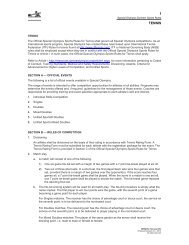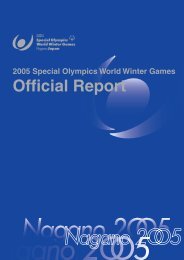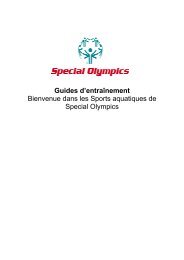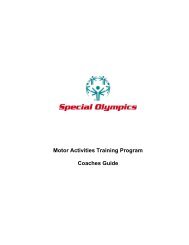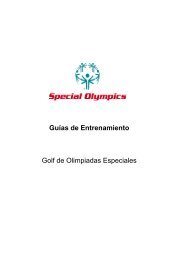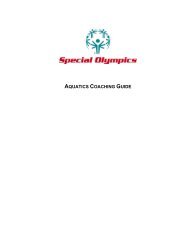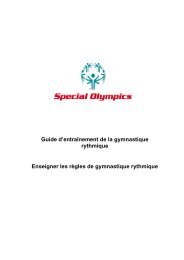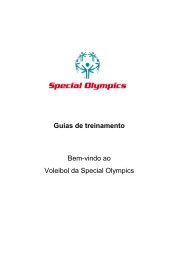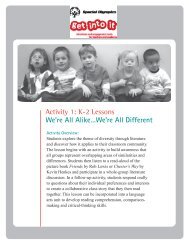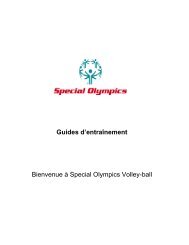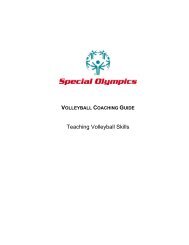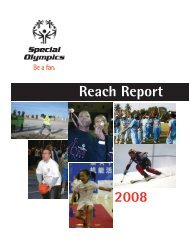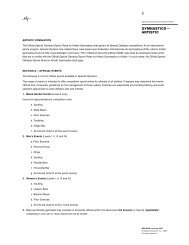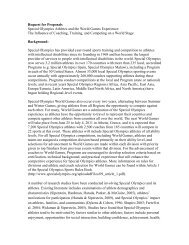BADMINTON Special Olympics Sports Skills Program
BADMINTON Special Olympics Sports Skills Program
BADMINTON Special Olympics Sports Skills Program
You also want an ePaper? Increase the reach of your titles
YUMPU automatically turns print PDFs into web optimized ePapers that Google loves.
<strong>Special</strong> <strong>Olympics</strong> believes that consistent training is essential<br />
to the development of sports skills and that competition<br />
a m o n g those of equal abilities is the most appropriate means<br />
of testing these skills, measuring progress, and providing<br />
incentives for personal growth.<br />
<strong>Special</strong> <strong>Olympics</strong> believes that through sports training and<br />
competition, people with intellectual disabilities benefit<br />
physically, mentally, socially, and spiritually; families are<br />
strengthened and the community-at-large, both through<br />
participation and observation, is united in understanding<br />
people with intellectual disabilities in an environment of<br />
equality, respect, and acceptance.<br />
<strong>Special</strong> <strong>Olympics</strong> believes that every person with intellectual<br />
disabilities who is at least eight years old should have the<br />
opportunity to participate in and benefit from sports training<br />
and competition. <strong>Special</strong> <strong>Olympics</strong> also permits individual<br />
programs to accept children from ages five through seven<br />
for training, but these children may not participate in <strong>Special</strong><br />
<strong>Olympics</strong> competitions.<br />
Operating Policies<br />
To provide the most enjoyable, beneficial, and challenging<br />
a c t ivities for athletes with intellectual disabilities, <strong>Special</strong><br />
O ly m p i c s ,worldwide, operates in accordance with the<br />
following operating policies. The General Rules of <strong>Special</strong><br />
<strong>Olympics</strong> and the Official <strong>Sports</strong> Rules are specifically<br />
designed to enforce these policies.<br />
1. <strong>Special</strong> <strong>Olympics</strong> training and competition are open to<br />
every person with intellectual disabilities who is at least<br />
eight years of age and who registers to participate in<br />
<strong>Special</strong> <strong>Olympics</strong> as required by the General Rules. There<br />
is no maximum age limitation for participation in <strong>Special</strong><br />
<strong>Olympics</strong>. An Accredited <strong>Program</strong> may permit children<br />
who are at least five years old to participate in ageappropriate<br />
<strong>Special</strong> <strong>Olympics</strong> training programs offered<br />
by that Accredited <strong>Program</strong>, or in specific (and ageappropriate)<br />
cultural or social activities offered during<br />
the course of a <strong>Special</strong> <strong>Olympics</strong> event. Such children<br />
may be recognized for their participation in such training<br />
or other noncompetitive activities through certificates of<br />
participation or through other types of recognition<br />
a p p r oved by SOI that are not associated with part i c i p a t i o n<br />
in <strong>Special</strong> <strong>Olympics</strong> competition. However, no child may<br />
participate in a <strong>Special</strong> <strong>Olympics</strong> competition (or be<br />
awarded medals or ribbons associated with competition)<br />
before his or her eighth birthday.<br />
2. <strong>Special</strong> <strong>Olympics</strong> must offer full participation for eve ry<br />
athlete regardless of his or her economic circumstances.<br />
<strong>Special</strong> <strong>Olympics</strong> Badminton <strong>Sports</strong> <strong>Skills</strong> <strong>Program</strong><br />
3. <strong>Special</strong> <strong>Olympics</strong> is an athlete-centered movement and<br />
b e l i eves that the athlete is all-important. Promoting athletes<br />
as the central focus of each training or competition<br />
program or event, developing the physical, social,<br />
psychological, intellectual, and spiritual qualities of the<br />
participants, and providing meaningful opportunities to<br />
participate in additional activities that support <strong>Special</strong><br />
<strong>Olympics</strong> programming must be the key emphasis of<br />
every Accredited <strong>Program</strong>.<br />
4 . <strong>Special</strong> <strong>Olympics</strong> encourages coaches and fa m i ly members<br />
of athletes to make every effort to encourage <strong>Special</strong><br />
<strong>Olympics</strong> athletes to reach their highest level of athletic<br />
achievement in a particular sport and to provide opportunities<br />
for them to do so.<br />
5. Each Accredited <strong>Program</strong> shall offer comprehensive<br />
year-round sports training, conducted by qualified<br />
coaches in accordance with these Official <strong>Sports</strong> Rules.<br />
Every <strong>Special</strong> <strong>Olympics</strong> athlete who competes in a<br />
<strong>Special</strong> <strong>Olympics</strong> sport at Games or a tournament must<br />
have been trained in that sport. Training shall include<br />
physical conditioning and nutrition education. Accredited<br />
<strong>Program</strong>s shall establish written minimum training<br />
requirements for competitors in each Official Sport, in<br />
accordance with their respective Accreditation Criteria<br />
and these Official <strong>Sports</strong> Rules. Athletes who desire to<br />
compete in Regional Games, State Games, or World<br />
Games must be trained for at least eight (8) consecutive<br />
weeks in the appropriate sport and must have several<br />
opportunities to compete (including scrimmages and<br />
practice sessions) during that period. Each accredited<br />
P r ogram should offer athletes who are preparing for<br />
competitions at other levels within <strong>Special</strong> <strong>Olympics</strong>,<br />
such as for National Games, Accredited P r ogram Games,<br />
local, area, or community games, the same training and<br />
competition opportunities as are offered by that<br />
Accredited <strong>Program</strong> to athletes who participate in<br />
Regional, State, and/or World Games.<br />
6. Every Accredited <strong>Program</strong> must offer a variety of sports<br />
events and activities that are appropriate to the age and<br />
ability of each athlete and consistent with the <strong>Program</strong>’s<br />
Accreditation Level and that foster full participation by<br />
each eligible athlete regardless of level of ability, degree of<br />
mental or physical disability, or economic circumstances.<br />
7. Every Accredited <strong>Program</strong> must, if required by its<br />
accreditation Level, include <strong>Special</strong> <strong>Olympics</strong> Unified<br />
<strong>Sports</strong> training and competition in which individuals<br />
with and without intellectual disabilities participate<br />
together on teams and the Motor Activities Training<br />
<strong>Program</strong> for individuals with such severe intellectual<br />
disabilies that they cannot benefit from standard <strong>Special</strong><br />
<strong>Olympics</strong> training and competition programs<br />
7



